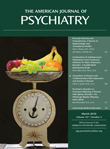To the Editor: Clozapine-related myocarditis is believed to be an uncommon type I hypersensitivity reaction, evidenced by eosinophilia and myocardial eosinophilic infiltrate in some affected patients (
1,
2). The median time to presentation is 15 days after clozapine initiation (
1). Mortality estimates are as high as 50% (
2).
Suspicion for myocarditis is indicated in clozapine-treated patients with fever, flu-like symptoms, chest pain, dyspnea, or other signs of cardiopulmonary disease. Recommended examinations include electrocardiogram and a serum troponin level test (
2). The diagnostic gold standard is endomyocardial biopsy (
2). Immediate cessation of clozapine is recommended when clinical suspicion is high (
2).
There are very few reports of uncomplicated clozapine rechallenge following clozapine-associated myocarditis (
2,
3) and a high frequency of recurrent myocarditis (
2). The risk-benefit ratio of rechallenge following myocarditis remains unclear. We present a case demonstrating that successful restart of clozapine treatment may be possible when signs of myocarditis are mild and nonspecific.
"Mr. W" was a 35-year-old man with schizoaffective disorder who had suffered a gradual worsening of psychosis over 5 years, culminating in several hospitalizations, with failed trials of multiple antipsychotic treatments and partial response to electroconvulsive therapy. Treatment with clozapine, 200 mg daily, resulted in significant improvement. Three weeks after clozapine initiation, the patient presented with left-shoulder pain on inspiration, cough, low-grade fever, and malaise. His vital signs, electrocardiogram, and transthoracic echocardiogram were normal. Troponin protein levels, erythrocyte sedimentation rate, and C-reactive protein levels were elevated to 0.05 ng/ml (reference range 0–0.5 ng/ml), 21 mm per hour (reference range: 0–10 mm/hour), and 7.15 mg/dl (reference range: 0–0.7 mg/dl), respectively. Clozapine-induced myocarditis was suspected, and treatment was switched from clozapine to olanzapine. Mr. W quickly decompensated with aggression, paranoia, and hallucinations and was hospitalized.
In consultation with the cardiology service 2 weeks later, laboratory examinations, chest X-ray, electrocardiogram, echocardiogram, and cardiac magnetic resonance imaging were obtained. The results of these tests were normal, including levels of troponin, brain natriuretic peptide, and immunoglobulin E and white blood cell and eosinophil counts, making the diagnosis of myocarditis questionable. The risks and benefits of clozapine retrial were discussed with the patient and his family, and the dosage of clozapine was increased to 550 mg daily, with a serum level of 250 ng/ml. There were no adverse effects, and the patient's psychosis improved.
The risk of restarting clozapine after myocarditis is high (
2), and evidence is insufficient to support a universal clinical guideline. Retrial may be reasonable in cases with severe psychiatric decompensation and absence of serious physical compromise during the initial episode of myocarditis or when the diagnosis of myocarditis is unlikely, such as in the present case. Retrial should involve slow inpatient titration of clozapine, with close monitoring (
3). More research is needed on the utility of diagnostic tests in the risk-benefit analysis of restarting clozapine after concern for myocarditis.

